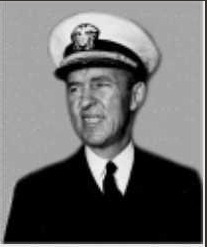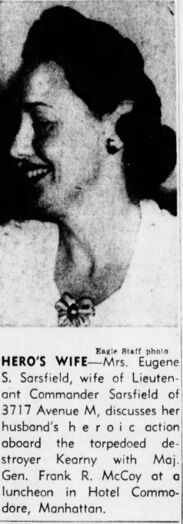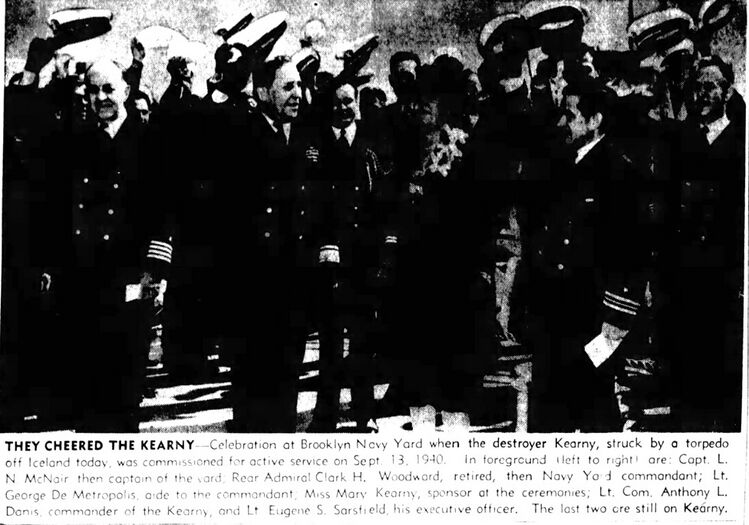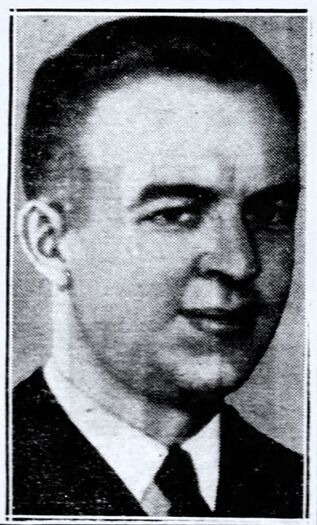EUGENE S. SARSFIELD, LCDR, USN
Eugene Sarsfield '26
Lucky Bag
From the 1926 Lucky Bag:
Eugene Sylvester Sarsfield
Brooklyn, New York
"Gene" "Sars"
HE is neither a salty sailor nor a hard-boiled, seagoing brute, but just a poor little boy who was enticed from his home and fireside by the desire to serve his Country. Since his arrival at Crabtown, Gene has performed lots of service. He has served extra-duty, served on the Sub-Squad, and served as a lifesaver for unfortunates who needed escorts for blind drags.
A natural Snake, he finds it just as easy to bring an end to his many romances and salvage his class pins as it is to start them. Yes, he has a way with the ladies unless they happen to be from Philadelphia, in which event they seem to have a way with him. If any young lady ever gets him, it goes without saying that she is a daughter of the City of Brotherly Love.
He is so meek, calm, and peaceful that one would believe him the heir to the earth, but there is a limit to even Gene's good nature when his Irish instincts predominate. Just ask the London taxi-driver.
Modest, lucky, and happy, he is one of the few men left who are not unctuous and obsequious.
"Better bone for that P-work, Gene."
"Aw, Hell, the luck of the Irish will carry me through," and it always has. For your sake, old man, may the Irish always be lucky.
Class Boxing (1); Sub-Squad (4, 3, 2, 1).
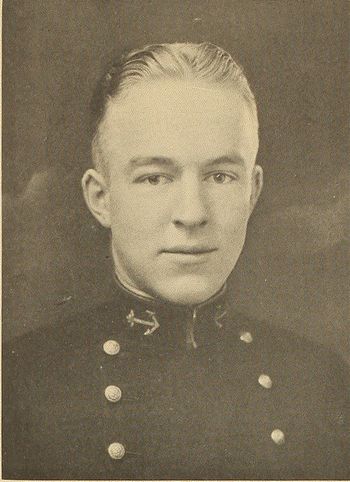
Eugene Sylvester Sarsfield
Brooklyn, New York
"Gene" "Sars"
HE is neither a salty sailor nor a hard-boiled, seagoing brute, but just a poor little boy who was enticed from his home and fireside by the desire to serve his Country. Since his arrival at Crabtown, Gene has performed lots of service. He has served extra-duty, served on the Sub-Squad, and served as a lifesaver for unfortunates who needed escorts for blind drags.
A natural Snake, he finds it just as easy to bring an end to his many romances and salvage his class pins as it is to start them. Yes, he has a way with the ladies unless they happen to be from Philadelphia, in which event they seem to have a way with him. If any young lady ever gets him, it goes without saying that she is a daughter of the City of Brotherly Love.
He is so meek, calm, and peaceful that one would believe him the heir to the earth, but there is a limit to even Gene's good nature when his Irish instincts predominate. Just ask the London taxi-driver.
Modest, lucky, and happy, he is one of the few men left who are not unctuous and obsequious.
"Better bone for that P-work, Gene."
"Aw, Hell, the luck of the Irish will carry me through," and it always has. For your sake, old man, may the Irish always be lucky.
Class Boxing (1); Sub-Squad (4, 3, 2, 1).
Loss
Eugene was lost on July 10, 1943 when USS Maddox (DD 622) was hit and sunk by German aircraft in the Mediterranean Sea off the coast of Gela, Sicily, during the invasion there. He had been the ship's commanding officer since she was commissioned on October 31, 1942.
Photographs
Biography
From Wikipedia:
Sarsfield was born in Brooklyn, New York, on 19 April 1902 and entered the United States Naval Academy in 1922. Upon his graduation on 3 June 1926, he was commissioned Ensign and served in Nevada (BB-36), New York (BB-34), and Hannibal (AG-1) before receiving submarine instruction in 1929 and torpedo training in 1930. During the next four years, he served successively in Greer (DD-145), Argonne (AP-4), and Constitution.
Following duty with the 3d Naval District, he joined Badger (DD-126) in July 1935, and returned to New York in September 1937. He instructed naval reservists in the 3d Naval District for two years before reporting to Kearny (DD-432) on 10 June 1940 to serve as executive officer and navigator. He was commended by the Secretary of the Navy, Frank Knox, for "Leadership, personal courage and ingenuity in solving the many problems arising under adverse conditions" when Kearny was torpedoed off Iceland on 17 October 1941.
Given command of McCormick (DD-223) on 8 December 1941, he was detached on 3 October to supervise the outfitting of Maddox (DD-622) and he assumed command of that destroyer at her commissioning on 31 October 1942.
From researcher Kathy Franz:
Eugene graduated from Cathedral College of the Immaculate Conception with a strong ability in mathematics. He attended a reunion in November 1934 and was elected reunion president.
In 1920 at the Philadelphia Navy Yard, his father Patrick was a navy instructor, and Eugene was a loftman.
He married Anne Regina Gartland on June 8, 1929, in St. Thomas Aquinas’ Church in Brooklyn.
In June, 1935, he and his wife and daughter Anne Regina took up their summer residence in Old Greenwich, Connecticut. Their second daughter was named Mary Beth.
Eugene’s father served as a navy lieutenant in the Spanish American War and WWI. Eugene’s mother was Ann, sister Lillian, and brothers Claude and Emmet. His parents were born in Ireland, and the family is descended from Gen. Patrick Sarsfield, a famous Irish hero.
From the Wisconsin State Journal, Madison, January 11, 1942:
In honoring the Kearny fighters Saturday night the navy said all 11 had died at their posts.
Entire Crew Praised
Although 14 Kearny men won special honors the official report of the action, written by the chief executive officer, Lieut. Eugene Sylvester Sarsfield, said:
“Every man on board this vessel performed his duty in accordance with the highest traditions of the United States navy and deserves to be commended.” . . .
The navy also made public Sarsfield’s terse report on the action which said:
“At 0000 (midnight) Oct. 17, 1941, all hands were called to general quarters to repel enemy submarine attacks. At 0010 (12:10 a. m.) this vessel was struck by enemy torpedo.
“Following the torpedo hit, all hands remained at their general quarters stations unless released until about 0600 (7 a. m.). There was no excitement or confusion. Every man carried out his assigned job and without thought of personal injury did his best to assist in maintaining the buoyancy and fighting efficiency of the ship.
Order prevailed in spite of the deafening noise of the explosion and the screeching blowing of the siren which was pulled open by the forces of the explosion.”
From the Brooklyn Daily Eagle, New York, November 19, 1942:
American sailors are “undoubtedly the best trained and the ‘fightingest” in the world,” Comm. Eugene S. Sarsfield, U. S. N., declared last night at a meeting of the Reichert Fraternity of the Alumni Association of Cathedral College held at the Columbia Club.
“Although young, with many of them in their ‘teen ages, they are without fear, no matter how great the odds against them,” Commander Sarsfield told the 75 members present.
“They do not fight with the fanaticism and brutality of the Japs. They fight because they have ideals – American ideals. Fired by these ideals of liberty and justice for all, they go into battle with the calmness and determination to win what is exemplified in our American sports,” he said.
“The recent naval battles in the Solomons when our boys sank 23 Jap ships clearly illustrate this fact,” the commander said.
Sarsfield was promoted to the rank of commander for heroism displayed when the U. S. S. Kearney was torpedoed off Iceland over a year ago.
From Together We Served:
- 1926-1929: USS Nevada (BB-36)
- 1926-1929: USS New York (BB-34)
- 1929-1929: Submarine School (diesel)
- 1930-1930: Torpedo Training Center (Faculty Staff)
- 1930-1934: USS Argonne (AP-4)
- 1931-1934: USS Greer (DD-145)
- 1931-1935: USS Constitution (Old Ironsides)
- 1935-1937: USS Badger (DD-126)
- 1937-1939: New York
- 1940-1941: USS Kearny (DD-432)
- 1941-1941: USS Mccormick (DD-223)
- 1942-1943: USS Maddox (DD-622)
His wife was listed as next of kin; they were married in 1929. He was also survived by two daughters, Anne (11) and Mary-Elizabeth (5), as well as his parents.
Eugene has a memory marker in New Jersey and is listed on another family marker in New York.
From Hall of Valor:
The President of the United States of America takes pride in presenting the Navy Cross (Posthumously) to Lieutenant Commander Eugene Sylvester Sarsfield (NSN: 0-60201), United States Navy, for extraordinary heroism and distinguished service in the line of his profession as Commanding Officer of the Destroyer U.S.S. MADDOX (DD-6232), during the amphibious invasion of Sicily on 10 July 1943. While his ship was effectively supporting the assault at Gela, Lieutenant Commander Sarsfield, in the face of terrific aerial bombardment, maintained alert and accurate direction of gunfire until the Maddox was gravely damaged by one direct hit and two near misses. Grimly standing by to supervise abandonment of the rapidly sinking vessel, he was responsible for saving the lives of nine officers and sixty-five men out of a total of two hundred and eighty-four on board. Lieutenant Commander Sarsfield's inspiring leadership and the valiant devotion to duty of his command contributed in large measure to the outstanding success of these vital missions and reflect great credit upon the United States Naval Service.
Service: Navy
Division: U.S.S. Maddox (DD-622)
General Orders: Bureau of Naval Personnel Information Bulletin No. 325 (April 1944)
Legion of Merit
From Hall of Valor:
The President of the United States of America takes pride in presenting the Legion of Merit (Posthumously) to Lieutenant Commander Eugene Sylvester Sarsfield (NSN: 0-60201), United States Navy, for exceptionally meritorious conduct in the performance of outstanding services to the Government of the United States while commanding the U.S.S. MADDOX (DD-622) on convoy duty in the Atlantic during World War II. Lieutenant Commander Sarsfield contacted a submerged U-Boat and delivered two depth-charge attacks with devastating accuracy. The damaged submarine capsized, came to the surface and probably sank.
General Orders: Bureau of Naval Personnel Information Bulletin No. 323 (February 1944)
Service: Navy
Rank: Lieutenant Commander
(Note: Postwar records show no U-boat was sunk by Maddox in this action.)
Memorial Park
Sarsfield Park in New York City is named for Eugene.
Namesake
USS Sarsfield (DD 837) was named for Eugene; the ship was sponsored by his widow.
The "Register of Commissioned and Warrant Officers of the United States Navy and Marine Corps" was published annually from 1815 through at least the 1970s; it provided rank, command or station, and occasionally billet until the beginning of World War II when command/station was no longer included. Scanned copies were reviewed and data entered from the mid-1840s through 1922, when more-frequent Navy Directories were available.
The Navy Directory was a publication that provided information on the command, billet, and rank of every active and retired naval officer. Single editions have been found online from January 1915 and March 1918, and then from three to six editions per year from 1923 through 1940; the final edition is from April 1941.
The entries in both series of documents are sometimes cryptic and confusing. They are often inconsistent, even within an edition, with the name of commands; this is especially true for aviation squadrons in the 1920s and early 1930s.
Alumni listed at the same command may or may not have had significant interactions; they could have shared a stateroom or workspace, stood many hours of watch together, or, especially at the larger commands, they might not have known each other at all. The information provides the opportunity to draw connections that are otherwise invisible, though, and gives a fuller view of the professional experiences of these alumni in Memorial Hall.
January 1927
April 1927
January 1928
April 1928
July 1928
October 1928
January 1929
April 1929
July 1929
October 1929
January 1930
April 1930
January 1931
April 1931
July 1931
October 1931
January 1932
April 1932
October 1932
January 1933
April 1933
July 1933
October 1933
April 1934
July 1934
October 1934
January 1935
April 1935
July 1936
January 1937
September 1937
January 1938
July 1938
January 1939
October 1939
June 1940
November 1940
April 1941

The "category" links below lead to lists of related Honorees; use them to explore further the service and sacrifice of alumni in Memorial Hall.
